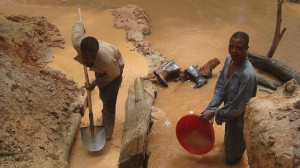Democratic Republic of the Congo (DRC) Mining May 2012″ by www.sourcingnetwork.org on Flickr
On 20 May, in a plenary assembly, the European Parliament voted in favor of a mandatory certification scheme for all importers of tin, tantalum, tungsten, and gold to ensure supply chain due diligence for possible conflict minerals. The law, approved by 402 votes to 118, with 171 abstentions, is overturning the Commission’s proposal to adopt a self-certification scheme and followed a joint action of several International NGOs calling for a stricter resolution to stop the trade in conflict minerals.
The joint action came in the form of an editorial written by Doctor Mukwege. In line with its broader mission to protect human rights defenders operating in high-risk areas, including those affected by the trade in conflict minerals, Protection International was also among the co-signers of this joint action.
We invite you to read the editorial text below:
On 20 May, the European parliament will vote on a proposed regulation to tackle the trade in conflict minerals. The trade in tin, tungsten, tantalum and gold (3TG) is fuelling conflict which has had devastating consequences for people in countries such as the Democratic Republic of Congo (DRC) and Colombia.
We are gravely concerned that the regulation proposed by the European Commission does not envision any real change. It makes it merely optional for importers to source these minerals responsibly. The proposed voluntary scheme would cover just 0.05% of companies using these minerals within the EU. No companies would be legally obliged to check whether they are complicit in finincing conflict or human right abuses.
The proposal in April 2015 by the European parliament’s committee on international trade on recommending binding “due diligence” requirements for approximately only 20 smelters and refiners based in Europe will not solve the problem. There must be legal requirements governing all companies that place these minerals on the European market – in any form, not just 3TG imported by a handful of smelters.
Extending the binding requirement to tackle the entire trade effectively – not just one part of it – would put the EU at the forefront of global efforts to create more transparent, responsible and sustainable business practices. It would also better align Europe with OECD standards on responsible sourcing and complement existing binding rules adopted by the US and several African countries, including DRC.
Members of the European parliament have an opportunity to help break the links between the minerals trade, conflict and human rights abuses – such as the large-scale sexual violence in eastern DRC, which Panzi Hospital is dedicated to healing. We urge them to ensure that, in line with its fundamental principles, the European parliament demands additional binding rules that put respect for human rights above narrow economic interests.
Dr Denis Mukwege
Founder and medical director, Panzi hospital, Bukavu, Democratic Republic of the Congo
Nicolas Van Nuffel
President, European Network for Central Africa (EurAc)
Christine Allen
Director of policy, Christian Aid
Iverna McGowan
Acting director and director of programmes, Amnesty International’s European Institutions Office
Patrick Alley
Co-founder and director, Global Witness
Oliver Buston
Director, Walk Free Movement
Karim Lahidji
President, International Federation for Human Rights (FIDH)
Brigitte Dufour
Director, International Partnership for Human Rights (IPHR)
Bernd Nilles
Secretary general, International Alliance of Catholic Development Agencies (CIDSE)
José Henríquez
Secretary General of Pax Christi International
Francesca Boniotti
Executive director, Avocats Sans Frontières (ASF)
Luis Enrique Eguren
Executive director, Protection International (PI)
Guido Barbera
President, Coordination of Popular Initiatives of International Solidarity (CIPSI)
Jérome Chaplier
Coordinator, the European Coalition for Corporate Justice (ECCJ)
José Ignacio Garcia SJ
Director, the Jesuit European Social Center (JESC)
Philippe Mayol
Head of Africa Department, CCFD-Terre Solidaire
Bernard Thibaud
Secretary General, Secours Catholique/Caritas France
To see the editorial published in The Guardian, please click here


